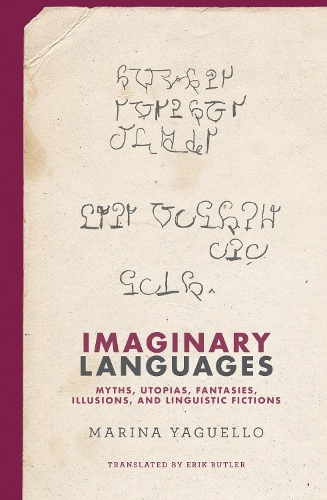
Imaginary Languages: Myths, Utopias, Fantasies, Illusions, and Linguistic Fictions
(Hardback)
Available Formats
Publishing Details
Imaginary Languages: Myths, Utopias, Fantasies, Illusions, and Linguistic Fictions
By (Author) Marina Yaguello
By (author) Erik Butler
MIT Press Ltd
MIT Press
17th May 2022
7th April 2022
United States
Classifications
General
Non Fiction
499.99
Physical Properties
Hardback
360
Width 133mm, Height 203mm
Description
An exploration of the practice of inventing languages, from speaking in tongues to utopian schemes of universality to the discoveries of modern linguistics. In Imaginary Languages, Marina Yaguello explores the history and practice of inventing languages, from religious speaking in tongues to politically utopian schemes of universality to the discoveries of modern linguistics. She looks for imagined languages that are autonomous systems, complete unto themselves and meant for communal use; imaginary, and therefore unlike both natural languages and historically attested languages; and products of an individual effort to lay hold of language. Inventors of languages, Yaguello writes, are madly in love- they love an object that belongs to them only to the extent that they also share it with a community. Yaguello investigates the sources of imaginary languages, in myths, dreams, and utopias. She takes readers on a tour of languages invented in literature from the sixteenth to the twentieth century, including that in More's Utopia, Leibniz's "algebra of thought," and Bulwer-Lytton's linguistic fiction. She examines the linguistic fantasies (or madness) of Georgian linguist Nikolai Marr and Swiss medium Hel ne Smith; and considers the quest for the true philosophical language. Yaguello finds two abiding (and somewhat contradictory) forces- the diversity of linguistic experience, which stands opposed to unifying endeavors, and, on the other hand, features shared by all languages (natural or not) and their users, which justifies the universalist hypothesis. Recent years have seen something of a boom in invented languages, whether artificial languages meant to facilitate international communication or imagined languages constructed as part of science fiction worlds. In Imaginary Languages (an updated and expanded version of the earlier Les Fous du langage, published in English as Lunatic Lovers of Language), Yaguello shows that the invention of language is above all a passionate, dizzying labor of love.
Reviews
"Expanding on a study published in France in 1984, a noted linguist surveys the history of language invention, an enterprise undertaken by centuries of lunatic lovers of language, for reasons philosophical, political, artistic, and arcane. Yaguello recounts the utopian impulses behind projects like Esperanto and Volapk; speculative fictions explorations of linguistic theory; and the search, rooted in Judeo-Christian mythology, for an original, universal tongue. The mind-bending nature of the books subject, which offers seemingly infinite paths of inquiry, could overwhelm, but Yaguello relates the material with gusto, offering an idiosyncratic, illuminating perspective on the development of Western thought."
the New Yorker
Author Bio
Marina Yaguello is Professor Emerita of Linguistics at the University of Paris VII.
